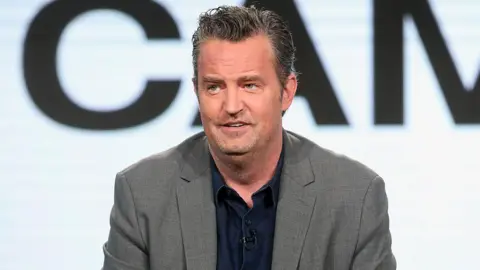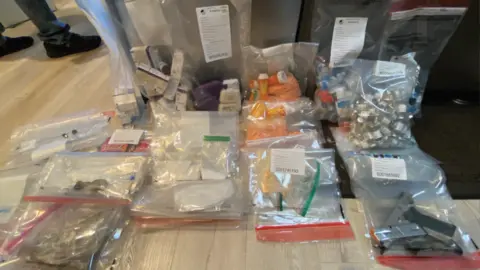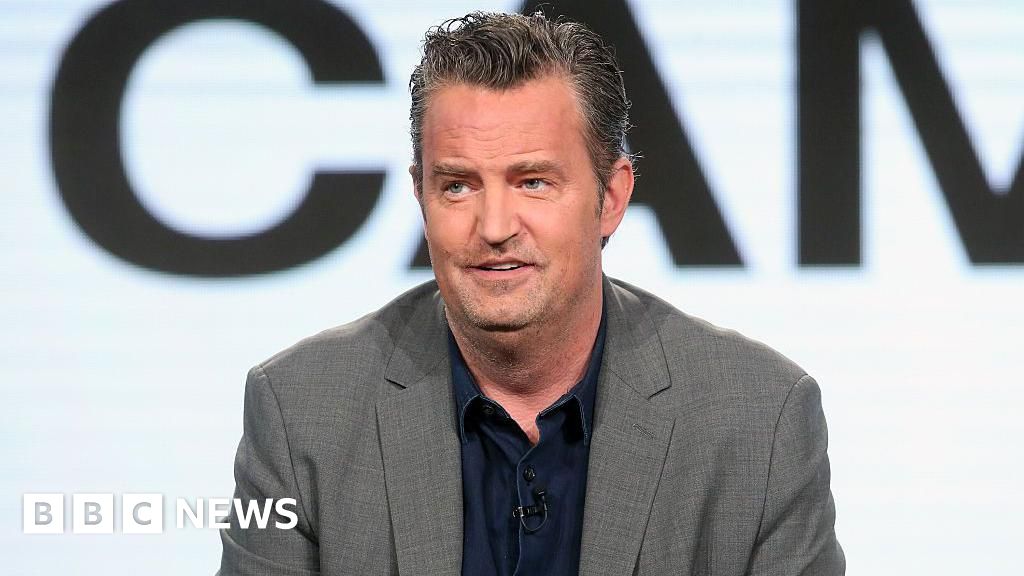Five people, including two doctors and the actor’s personal assistant, have been charged in the drug-related death of Matthew Perry last year, police said.
Police said Thursday that an investigation they launched in May uncovered an “extensive underground criminal network” of drug suppliers who distributed large quantities of ketamine.
Perry, 54, died in October at his home in Los Angeles. An autopsy found high levels of ketamine in his blood and determined the “acute effects” of the controlled substance contributed to his death.
“These defendants exploited Mr. Perry’s drug addiction for personal gain,” U.S. Attorney Martin Estrada said Thursday. “They knew what they were doing would put Mr. Perry in great danger, but they did it anyway.”
 Getty Images
Getty ImagesThree of the defendants – including Perry’s aide – have pleaded guilty to drug charges, while two others – a doctor and a woman known as the “Ketamine Queen” – were arrested Thursday, according to the Justice Department.
Ketamine is a powerful anesthetic used to treat depression, anxiety and pain. People close to Perry, who starred in NBC’s Friends, told the coroner’s inquest after his death that he was receiving a ketamine infusion.
But his last treatment came just over a week before his death. The medical examiner said the ketamine in Perry’s system could not have come from the infusion treatment because of the drug’s short half-life.
According to the medical examiner, the levels of ketamine in his system were as high as those under general anesthesia.
An indictment filed in federal court details an elaborate drug-buying scheme that prosecutors say ultimately led to Perry’s death.
Prosecutors say Perry’s assistant Kenneth Rock was working with two doctors to provide him with more than $50,000 (£38,000) of ketamine in the weeks before his death.
Officials argued that those involved in the scheme sought to profit from Perry’s well-known substance abuse problems. One of the doctors, Salvador Plasencia, allegedly wrote in a text message: “I wonder how much this idiot will pay.”
 United States District Court
United States District CourtThe indictment alleges that Mr. Placencia, 42, provided ketamine to Perry “outside the ordinary course of professional practice and without a legitimate medical purpose.”
He also allegedly taught Yanzheng how to inject Perry with ketamine without proper safety procedures and surveillance, the police complaint states.
Prosecutors said Yanzheng gave Perry at least 27 injections of ketamine in the four days before his death.
Prosecutors said he did so even after taking a large dose of ketamine earlier that month that caused Perry to “freeze,” leading Mr. Plasencia to recommend against taking similar doses of ketamine in the future. The doctor still left several bottles of the medication with the actor and his assistant after the incident, according to the indictment.
Others charged in the case include the so-called “Ketamine Queen” Jasveen Sangha, who joined two other co-defendants, Erik Flemming and Mark Chave. The drug was provided to Placencia with the help of Dr. Mark Chavez.
 United States District Court
United States District CourtChavez, Fleming and Iwamasa have all pleaded guilty.
Ms. Sanga and Mr. Plasencia will be arraigned in a Los Angeles court on Thursday afternoon, the Justice Department said.
Prosecutors say the defendants tried to cover up their alleged crimes after Perry’s death.
Ms Sanga allegedly texted another suspect, telling him to “delete all our messages”. Mr. Placencia also falsified medical records, according to the indictment.
Drowning was also cited as a factor in Perry’s death, which was ruled an accident. Other contributing factors include coronary artery disease and the effects of buprenorphine, which is used to treat opioid use disorder.
At the height of his fame, Perry struggled with addiction to painkillers and alcohol and checked into rehab multiple times. He detailed his battle with substance abuse in his memoir, “Friends, Lovers, and Big Scary Things.”
In 2016, he told BBC Radio 2 that he had no memory of filming Friends for three years due to alcohol and drug abuse.
After trying treatment, he wrote in his memoir that he had remained mostly sober since 2001 — “except for about 60 or 70 accidents.”


